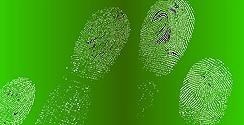Biometric Sharing Initiative
Making the World Safer

The FBI’s Integrated Automated Fingerprint Identification System contains records of approximately 67 million criminal subjects, including known or suspected terrorists, military detainees, and international criminals.
Known or suspected terrorists. Transnational criminals. Both threaten not only U.S. security but the security of nations around the world.
One way to help reduce this threat is for nations to share fingerprints and other kinds of biometric information on terrorist-related subjects and international criminals who’ve had previous brushes with law enforcement. Here in the U.S., the FBI’s Criminal Justice Information Services Division—through its Foreign Biometric Exchange program—serves as the centralized collection point for foreign fingerprint records and other biometric data.
Actually, the Bureau has been exchanging fingerprints internationally for nearly 80 years (see previous story), primarily in criminal matters. But after the terrorist attacks of 9/11, the U.S. Attorney General specifically directed the FBI to obtain and maintain fingerprints and other biometrics for known and suspected terrorists processed by foreign law enforcement agencies. We then expanded the initiative to include international criminals, who, like terrorists, routinely cross national borders to commit their crimes and often use aliases.
The Foreign Biometric Exchange program is coordinated by CJIS’s Global Initiatives Unit. Says Gary Wheeler, who heads up the unit, “Our mission is two-fold—in addition to collecting and analyzing the data we receive, we also offer assistance to nations who want to develop their own automated biometric systems that meet international standards.” To accomplish both tasks, unit personnel work with our International Operations Division at FBI headquarters, our legal attaché officers overseas, and sometimes INTERPOL and other U.S. federal agencies.
Success Story: Mexico
 Earlier this year, CJIS provided fingerprints belonging to more than 200 FBI fugitives with violent criminal histories for comparison against the Mexico fingerprint system; in return, Mexico provided nearly 100 prints relating to high-ranking drug cartel members and prison escapees to be run against the FBI’s IAFIS.
Earlier this year, CJIS provided fingerprints belonging to more than 200 FBI fugitives with violent criminal histories for comparison against the Mexico fingerprint system; in return, Mexico provided nearly 100 prints relating to high-ranking drug cartel members and prison escapees to be run against the FBI’s IAFIS.
The results? Of the records provided by the FBI to Mexico, nearly 20 percent of the fugitives had previously been arrested in Mexico, while more than a quarter of the records Mexico provided to the FBI revealed existing U.S. records.
And in the past couple of years—while working specific cases involving fingerprint exchanges—we’ve returned to Mexico dangerous fugitives who fled to the U.S., including two men wanted separately for child murders, one wanted for rape and murder, and five escapees from a Mexican prison.
How it all works
If a nation is interested in participating, we first assess its fingerprint capabilities through surveys and on-site visits. Then we determine what, if any, assistance we can provide in terms of equipment—like mobile fingerprint devices—and training in areas like basic fingerprinting and identification, crime scene preservation, and latent print collection.
Once we begin receiving data from a global partner—either in batches or on a case-by-case basis—we run their fingerprints (both known and unknown) against our Integrated Automated Fingerprint Identification System (IAFIS). Currently, IAFIS contains records of approximately 67 million criminal subjects, including known or suspected terrorists, military detainees, and international criminals.
If there’s a match in IAFIS, we notify the submitting nation. If there’s no match, a new IAFIS record can be created and included in future searches requested by international, national, and perhaps most importantly, local law enforcement officers who are our first line of defense against threats to public safety.
Since 2002, the Global Initiatives Unit has developed relationships with more than 50 countries and has received over 450,000 biometric records that have been added to IAFIS.



